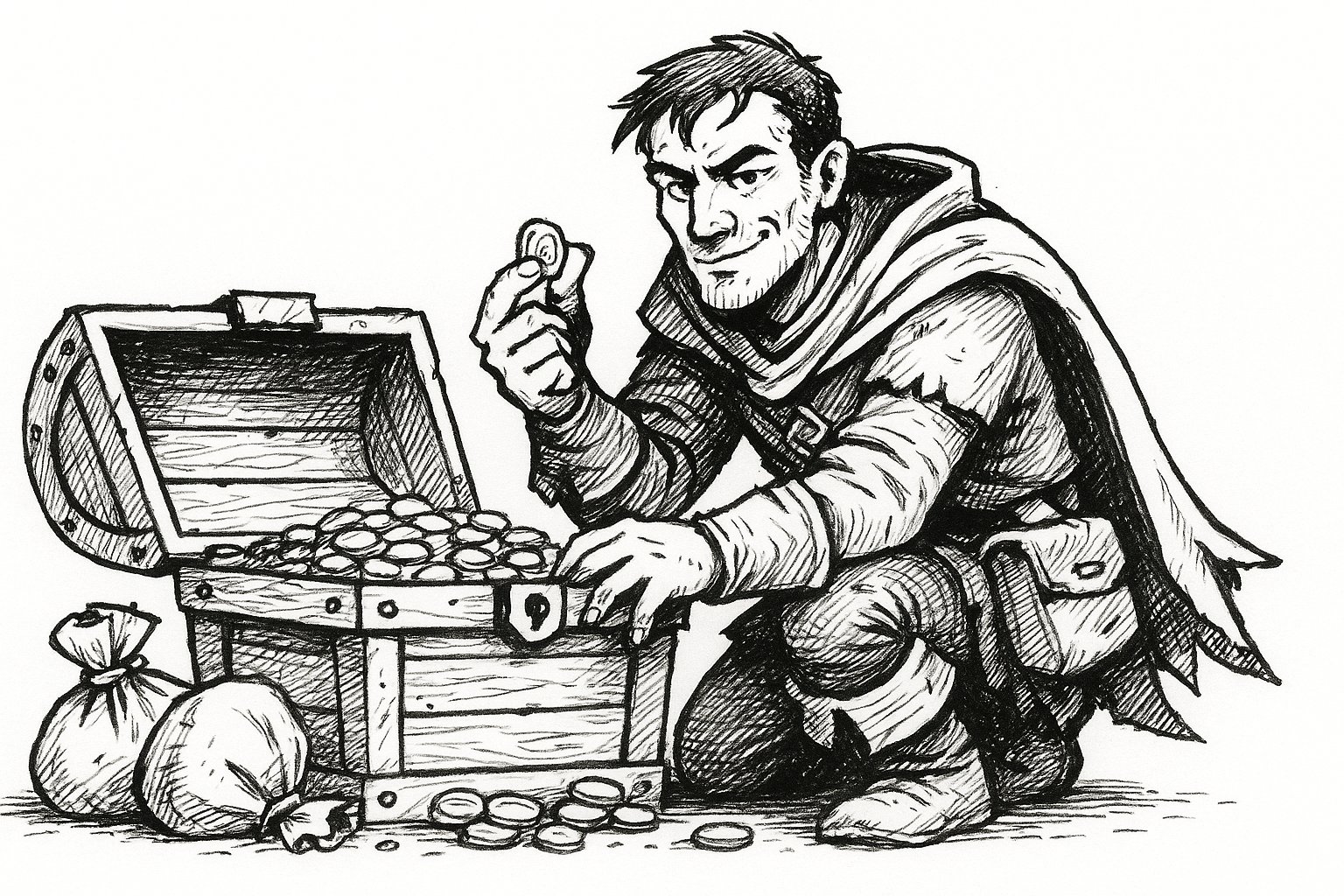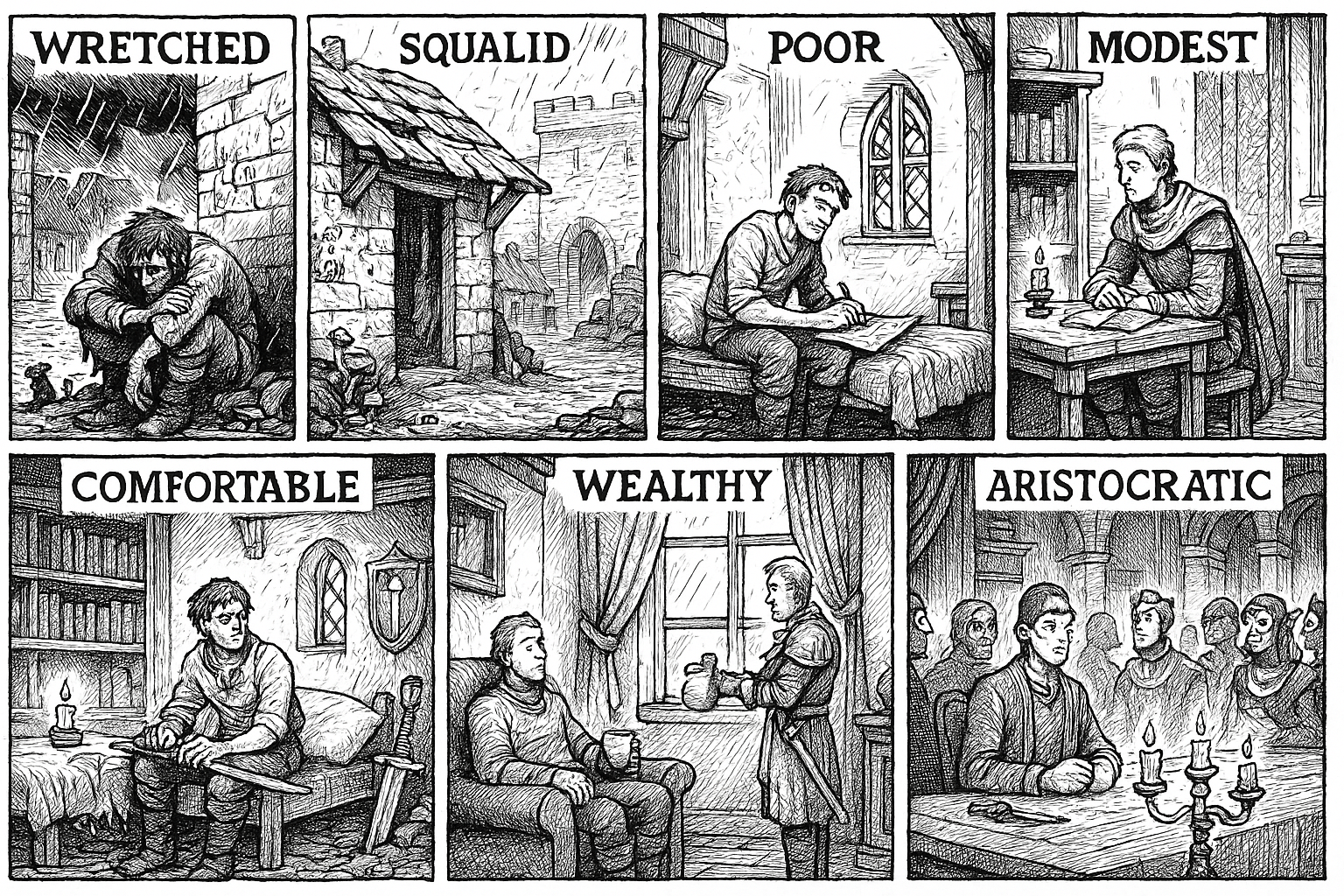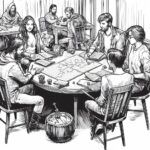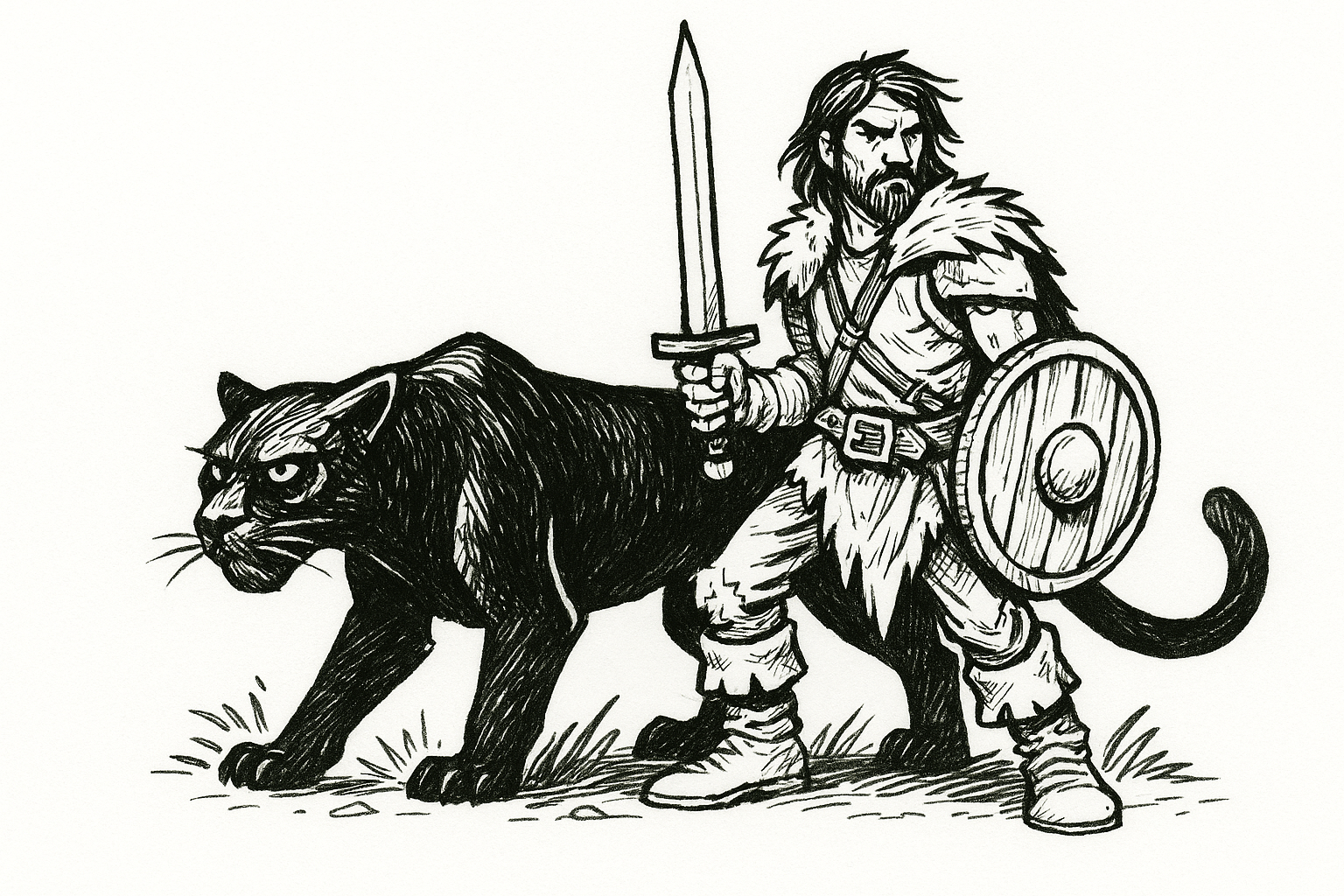
Currency
Currency in Cresthaven is divided into copper pieces (cp), silver pieces (sp), and gold pieces (gp). The rate of exchange between coins is as follows:
- 10 copper pieces (cp) = 1 silver piece (sp)
- 10 silver pieces (sp) = 1 gold piece (gp)
- 10 gold pieces (gp) = 1 platinum piece (pp)
Lifestyle Expenses
Lifestyle expenses offer a simple way to account for the harsh realities of living in Cresthaven. They cover your accommodations, food and drink, and all your other necessities. What’s more, these expenses include the cost of maintaining your equipment, ensuring you’re always ready for adventure in a dangerous world.
At the start of each week or month (your choice), simply select a lifestyle from the Expenses table and pay the listed price to sustain it. The prices shown are per day, so if you’re calculating for a thirty-day period, multiply the listed price by 30. Your chosen lifestyle might shift based on your available funds, or you might cling to the same one throughout your character’s grim career.
Your lifestyle choice isn’t just about money; it has stark consequences. Maintaining a wealthy lifestyle might help you forge contacts with the rich and powerful, though it also carries the significant risk of attracting thieves, rivals, or political enemies. Likewise, living frugally could help you avoid immediate criminal attention, but you’re far less likely to make powerful connections or gain valuable information from the upper echelons of society.
If you cannot pay your selected lifestyle cost when due, you immediately drop to the next lowest tier for the remainder of the period. This may trigger story complications, illness, or loss of social standing, at the DM’s discretion, reflecting the swift downturns of life in Cresthaven. Example: A character who can no longer afford a Modest lifestyle immediately drops to Poor. They may attempt to regain their prior standing by paying twice the daily cost for three consecutive days, or by completing a meaningful social or professional task at the DM’s discretion.
Lifestyle Expenses Table
| Lifestyle | Price/Day |
|---|---|
| Wretched | (See Description) |
| Squalid | 1 sp |
| Poor | 2 sp |
| Modest | 1 gp |
| Comfortable | 2 gp |
| Wealthy | 4 gp |
| Aristocratic | 10 gp minimum |
Lifestyle Descriptions

Wretched. You live in inhumane conditions. With no place to call home, you shelter wherever you can; sneaking into derelict barns, huddling in old crates, and relying on the strained good graces of people only marginally better off than you. A wretched lifestyle presents abundant dangers. Violence, disease, and gnawing hunger are your constant companions. Other wretched souls covet your armor, weapons, and adventuring gear, which represent a fortune by their desperate standards. You are the target of pity at best, suspicion at worst.
Squalid. You live in a leaky stable, a mud-floored hut just outside town, or a vermin-infested boarding house in the worst, most crime-ridden part of town. While you have meager shelter from the elements, you exist in a desperate and often violent environment, rife with disease, hunger, and misfortune. You are beneath the notice of most people and have few legal protections from the whims of the powerful. Most individuals at this lifestyle level have suffered some terrible setback; they might be disturbed, marked as exiles, or suffer from chronic illness.
Poor. A poor lifestyle means going without the comforts available in a stable community. Simple, often bland, food and cramped lodgings, threadbare clothing, and unpredictable conditions result in a sufficient, though probably unpleasant, existence. Your accommodations might be a shared room in a flophouse or a cot in the common room above a low-tier tavern. You benefit from some legal protections, but you still have to contend with casual violence, petty crime, and the ever-present threat of disease. People at this lifestyle level tend to be unskilled laborers, costermongers, peddlers, thieves, down-on-their-luck mercenaries, and other disreputable types.
Modest. A modest lifestyle keeps you out of the worst slums and ensures that you can adequately maintain your equipment. You live in an older, but respectable, part of town, renting a clean room in a boarding house, inn, or temple. You don’t go hungry or thirsty, and your living conditions are simple but clean. Ordinary people living modest lifestyles include dutiful soldiers with families, steady laborers, diligent students, humble priests, practical hedge wizards, and the like.
Comfortable. Choosing a comfortable lifestyle means you can afford nicer clothing and easily maintain your equipment to a high standard. You live in a small cottage in a middle-class neighborhood or in a private room at a reputable inn. You associate with established merchants, skilled tradespeople, and commissioned military officers. Life is stable, but not without its everyday concerns.
Wealthy. Choosing a wealthy lifestyle means living a life of luxury, though you might not have achieved the ingrained social status associated with the old money of nobility or royalty. You live a lifestyle comparable to a highly successful merchant, a favored royal servant, or the owner of a few prosperous businesses. You have respectable lodgings, usually a spacious home in a good part of town or a comfortable suite at a fine inn, and likely employ a small staff of servants. Your possessions draw attention, and your social circles come with their own subtle dangers. Be wary: a flashy lifestyle can draw the unwanted attention of cutthroats and opportunists interested in robbery or kidnapping.
Aristocratic. You live a life of plenty and overt comfort, moving in circles populated by the most powerful, and often ruthless, people in the community. You have excellent lodgings, perhaps a private townhouse in the nicest, most guarded part of town or a sprawling suite in the finest inn. You dine at the best, most exclusive restaurants, retain the most skilled and fashionable tailors, and have servants attending to your every need. You receive invitations to the gilded social gatherings of the rich and powerful, spending evenings in the company of cunning politicians, influential guild leaders, zealous high priests, and manipulative nobility. However, you must also contend with the highest levels of deceit and treachery; you move in dangerous circles of power, where smiles hide daggers and every invitation has strings attached. The wealthier you are, the greater the chance you’ll be drawn into political intrigue as a pawn, or perhaps, a willing participant. Living Aristocratically may also require additional daily or weekly expenses to maintain appearances, host events, or pay necessary bribes. At the DM’s discretion, failure to maintain your status may cause scandal, political fallout, or a swift loss of favor within these elite circles.
Optional Rules for Lifestyle Impact
To emphasize the tangible effects of your chosen lifestyle, consider applying the following mechanical modifiers:
- Squalid or worse: Disadvantage on Charisma (Persuasion) checks when interacting with city officials, nobles, or anyone of significant social standing.
- Comfortable or higher: Advantage on Charisma (Gather Information) checks when seeking rumors or news in upper-class districts or social gatherings.
- Recovery Impact:
- Characters living at Comfortable or higher may recover 1 extra Hit Point per day of downtime due to improved rest, food, and access to medicine.
- Characters living at Squalid or Wretched may recover 1 less Hit Point per day or risk gaining a level of Fatigue if injured or ill.
- Aristocratic Political Fallout: If an Aristocratic character fails to maintain their lifestyle for a full week, they suffer Disadvantage on all Persuasion, Deception, and Insight checks involving nobles or Order officials until they regain their status or perform a significant favor to restore their reputation.
Group Lifestyle Sharing
Players may pool resources to share a lifestyle if staying in the same lodging. Divide the total lifestyle cost by the number of party members sharing, rounding up. Only apply the benefits of that lifestyle to downtime activities taking place in that shared setting (e.g., social contacts, research, recovery).
Self-Sufficiency
The expenses and lifestyles described above assume you’re spending your time between adventures in town, utilizing services you can afford. However, some characters might prefer to spend their time away from civilization, sustaining themselves in the wild by hunting, foraging, and repairing their own gear.
Choosing to live off the land requires a Wisdom Check DC 15. On a success, you manage to gather enough provisions and maintain your gear to sustain a Poor lifestyle for free that day. If you succeed by 5 or more (a result of 20 or higher), you are able to live comfortably, maintaining the equivalent of a Comfortable lifestyle for free.
Failure results in direct, immediate consequences, as determined by the Game Master, which might include gaining a level of fatigue, suffering from exposure, or finding your gathered rations spoiled, forcing you to seek immediate provisions or risk starvation. This lifestyle choice significantly impacts your daily activities, limiting your ability to engage in other downtime pursuits or professions.
Individual Provisions & Lodging
While your chosen lifestyle generally covers your basic living costs, the Individual Provisions & Lodging table provides prices for single food items and a night’s stay. These individual prices are typically included within your chosen lifestyle’s cost, but they are useful for purchasing additional provisions, splurging on a specific meal, or covering costs when your lifestyle choice doesn’t fully apply (e.g., a Modest character splurging on a single banquet, or a Wealthy character needing a quick loaf of bread while on the road). Note: Lifestyle costs also include gear maintenance, laundry, street taxes, casual bribes, and other incidental expenses that add up over time. Lodging and food alone do not represent the full cost of living in Cresthaven.
Food, Drink, and Lodging Table
| Item | Cost |
|---|---|
| Ale (Gallon) | 2 sp |
| Ale (Mug) | 4 cp |
| Banquet (per person) | 10 gp |
| Bread, loaf | 2 cp |
| Cheese, hunk | 1 sp |
| Inn Stay (per day) | |
| Squalid | 7 cp |
| Poor | 1 sp |
| Modest | 5 sp |
| Comfortable | 8 sp |
| Wealthy | 2 gp |
| Aristocratic | 4 gp |
| Meals (per day) | |
| Squalid | 3 cp |
| Poor | 6 cp |
| Modest | 3 sp |
| Comfortable | 5 sp |
| Wealthy | 8 sp |
| Aristocratic | 2 gp |
| Meat, chunk | 3 sp |
| Wine (Common Pitcher) | 2 sp |
| Wine (Fine Bottle) | 10 gp |
Services
Adventurers can pay non-player characters to assist them or act on their behalf in a variety of dangerous and mundane situations. Most such hirelings (see full write up on hirelings) possess ordinary skills, while others are masters of a craft or art, and a select few are experts with specialized adventuring skills who command significant compensation.
Some of the most basic types of hirelings appear on the Services table. Other common hirelings include any of the wide variety of people who inhabit a typical town or city, paid by adventurers to perform a specific task. For example, a wizard might pay a carpenter to construct an elaborate chest (and its miniature replica) for use in the secret chest spell. A fighter might commission a blacksmith to forge a special sword, or a bard might pay a tailor to make exquisite clothing for an upcoming performance before the duke.
Other hirelings provide more expert or dangerous services. Mercenary soldiers paid to help adventurers take on a hobgoblin army are hirelings, as are sages hired to research ancient or esoteric lore. If a high-level adventurer establishes a stronghold, they might hire a whole staff of servants and agents to run the place; from a castellan or steward to menial laborers to keep the stables clean. These hirelings often enjoy a long-term contract that includes a place to live within the stronghold as part of their compensation.
Services Table
| Service | Pay |
|---|---|
| Coach cab (Between towns) | 3 cp per mile |
| Coach cab (Within a city) | 1 cp |
| Hireling (Daily Pay) | |
| Laborer (unskilled) | 1–2 sp |
| Artisan (e.g., blacksmith, carpenter, scribe) | 5 sp – 1 gp |
| Mercenary (light arms, basic guard) | 1 gp |
| Specialist (e.g., alchemist, master artisan, spy, guide) | 2–10 gp+ (negotiated based on risk/rarity) |
| Messenger | 2 cp per mile |
| Road or gate toll | 1 cp |
| Ship’s passage | 1 sp per mile |
Laborers (unskilled) are hired for basic, menial work requiring no particular skill, such as porters, maids, or ditch-diggers. Artisans possess proficiency in a specific trade, capable of crafting items or providing skilled labor. Mercenaries (light arms) can serve as basic guards or muscle for less dangerous tasks. For more specialized or dangerous undertakings, Specialists like alchemists, master artisans, spies, or wilderness guides command higher, often negotiated, rates. Their pay reflects the risk involved, the rarity of their skills, and the social standing they command within Cresthaven.
- Coach and Ship Rates Clarification:
- Assume an average travel speed of 30 miles per day over roads by coach, or 20 miles by riverboat.
- Costs listed are one-way unless negotiated otherwise.
Spellcasting Services
Magic in Cresthaven is a force of raw, unpredictable power, and its practice is not taken lightly. Access to formal spellcasting services is scarce and heavily policed, reflecting the Hermetic Order of the Magi’s iron grip on arcane knowledge.
The Hermetic Order of the Magi maintains strict control over all recognized spellcasting within Cresthaven. Operating outside their rigid protocols can lead to severe repercussions, including heavy fines, public shaming, or even exile from Order territories. The more potent or rare a spell, the more challenging it is to find a sanctioned caster, and the greater the price in coin, influence, or dangerous favors.
Legitimate spellcasting services are primarily found within Order-aligned cities or significant religious holdings recognized by the Order. Any other attempt to acquire spellcasting, whether through dealings with reclusive hedge witches, forgotten cults hidden deep in the wilds, or desperate acts of subterfuge, comes with inherent and often perilous risks.
While common 1st or 2nd-level spells, such as Cure Wounds or Identify, might be available for purchase in Order-sanctioned enclaves or major temples, their cost (typically 10 to 50 gold pieces, plus any expensive material components) is a testament to their rarity and the Order’s control. Seeking higher-level magic is far more arduous, often requiring adventurers to barter dangerous favors directly with powerful Order magi, or to seek out forbidden knowledge from clandestine sources. These desperate bargains might involve retrieving volatile artifacts from monster-infested ruins, traversing treacherous lands to deliver sensitive information, or undertaking other tasks too dangerous for anyone but adventurers.
Example Spellcasting Fees (if legally performed under Hermetic Order supervision):
- Cure Wounds (1st-level); 10 gp (A common ward against minor ailments, sanctioned for public aid.)
- Identify (2nd-level); 25 gp + 100 gp pearl (consumed) (A fundamental arcane service, requiring a clear, pure focus.)
- Remove Curse (3rd-level); Rare. Might require a significant favor to a powerful Order mage, a substantial donation to the Temple of Aysys, or undeniable proof of loyalty to specific factions. (Such complex magic demands greater trust and sacrifice.)
Village of Cresthaven Services: Within the humble Village of Cresthaven, direct spellcasting services from the Order are scarce. However, those seeking arcane assistance can visit the Oddities Shoppe and discreetly inquire with its proprietors: Micael, a male half-elf, and Evan, a perceptive female elf. They may offer scrolls or connections to less conventional magical aid. For healing and spiritual succor, the Temple to Aysys stands as a beacon. Father Harder, a devoted servant of the divine, offers a number of different clerical services for those seeking to mend their wounds, cleanse their spirits, or find guidance in troubled times.
- Divine Casters Note: Divine spellcasting services may be available through temples, but typically only to those who prove sufficient faith, loyalty, or generosity to the church’s goals. In rural areas, even low-level divine spells may be rare or entirely unavailable.





